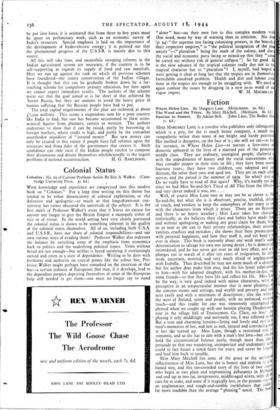Colonial Status
Colonies : No. zo of Current Problems Series. By Eric A. Walker. (Ca bridge University Press. 3s. 6d.) WIDE knowledge and experience are compressed into this modest book on " Colonies." For a long time writing on this theme has tended to be either denunciatory of colonial exploitation, or else defensive and apologetic—so much so that long-drawn-out con- troversy has rather obscured the universals of the subject. It is the first merit of Professor Walker's essay that it 'leaves no excuse for anyone any longer to give the British Empire a monopoly either of vice or of virtue. In the world setting here very clearly portrayed the colonial status is shown to be something inherent in the quality of the colonial states themselves. All of us, including both U.S.A. and U.S.S.R., have our share of colonial responsibilities—and our own various ways of evading them! Professor Walker also redresses the balance by switching some of the emphasis from economics back to politics and the underlying political issues. Votes without bread are not enough—but neither is bread satisfying if everlastingly earned and eaten in a state of dependence. Writing as he does with freshness and authority on crucial points like the colour bar, Pro- fessor Walker might perhaps have remarked on the inversion of that bar—a certain jealousy of Europeans that may, if it develops, lead to the dependent peoples depriving themselves of some of the European help still needed to get them—one must no longer say to stand
"alone" but—on their own feet in this complex modem wo One word, more by way of warning than in criticism. No d (p. 94) " the supreme test facing colonising powers, in the bounds their respective empires," is " the political integration of the p1 society "—(" pluralism " being the mark of the colony, and due the social and economic parts being so mixed-up that they "can be sorted out without risk of general collapse.") So far good. is the slow advance Of the tropical colonies really due not to th tropical character but to " pluralism "? I, myself, had hoped were getting it clear• at long last that the tropics are in themselves formidable unsolved problem. Health and diet and labour con tions in the tropics are enough to be struggling with. We need again confuse the issues by dragging in a new ju-ju word of s






















 Previous page
Previous page